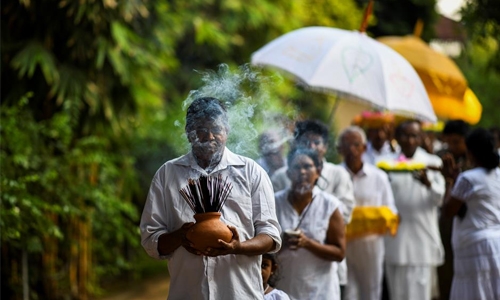Sri Lanka churches halt public services
Sri Lanka’s Catholic churches suspended all public services over security fears yesterday, as thousands of troops joined the hunt for suspects in deadly Easter bombings that killed nearly 360 people.
Security forces also made fresh arrests overnight over the attacks, as the government faced pressure over its failure to act on intelligence warnings about possible bombings. Recriminations have flown since suicide bombers blew themselves up in luxury hotels and churches packed with Easter worshippers on Sunday. Overnight, security forces using newly granted powers under the country’s state of emergency arrested 16 more suspects in connection with the attacks.
Police have so far arrested 75 people but tensions remain high with several suspects unaccounted for. A senior Catholic priest said that all public services were being suspended and all churches closed “on the advice of security forces”. Private services for burials will still be carried out, but no public masses are scheduled. Brigadier Sumith Atapattu said the army had increased its deployment by 1,300 to 6,300 overnight, with the navy and airforce also deploying 2,000 more personnel.
Authorities also announced a ban on drone flights and suspended licences issued to commercial operators with immediate effect. Defence official resigns Sri Lanka’s government has come under increasing pressure over the revelation it failed to act on intelligence about planned attacks, which claimed nearly 360 lives, and Hemasiri Fernando had been widely expected to step down. A defence ministry official said Fernando had submitted a letter of resignation to head-ofstate Maithripala Sirisena.
“He told the president that he was accepting responsibility and resigning so that the president can make a new appointment,” the official said, speaking on condition of anonymity. Indian intelligence shared several specific warnings about attacks with Sri Lankan authorities, an Indian source said, but the information was not given to ministers, in what the government has called a “major” lapse. Authorities are now in a desperate hunt for suspects linked to the attacks, and police yesterday released the names and photos of three men and three women they want to question..
“Most of them are well-educated and come from middle, upper-middle class families, so they are financially quite independent and their families are quite stable financially, that is a worrying factor in this,” the minister added. Security forces using state of emergency powers arrested 16 more suspects overnight, bringing the total in custody to 74. Sirisena met with political party leaders on Thursday and announced he would revive a military-police body last used during the country’s fight against Tamil insurgents to coordinate operations after the bombings.
Key suspect
An FBI team is now in Sri Lanka, Wijewardene said, and Britain, Australia and the United Arab Emirates have also offered intelligence help. Experts say the bombings bear many of the hallmarks of IS attacks, and the government has suggested local militants could not have acted alone. But it has not yet officially confirmed any IS role in the blasts. A key suspect in the attacks also remains unaccounted for: NTJ leader Zahran Hashim. He appears to be among eight people seen in a video released Tuesday by IS after it claimed the attacks, seen leading a pledge of allegiance to IS chief Abu Bakr al-Baghdadi. Officials said it was still unclear whether Has him was among the suicide attackers or had escaped after the blasts.
Authorities have said they cannot rule out further attacks while suspects remain at large. In all, nine people are believed to have blown themselves up on Sunday, either during attacks or when police attempted to arrest them. Sri Lankan police sources have said that two Muslim brothers, sons of a wealthy Colombo spice trader, blew themselves up at the Shangri-La and the Cinnamon Grand hotels. Their father is now in custody. The Kingsbury hotel in the capital was the last one hit. A fourth planned attack on a hotel failed, authorities said.
The would-be attacker was followed back to a Colombo lodge, where he blew himself up, killing two people. Sources close to the investigation said two more people -- a man and a woman -- blew themselves up at another location as security forces launched a raid. Those blasts killed three police. Dozens of foreigners were among the victims of the blasts, including three children of a Danish billionaire, eight Britons, 10 Indians and four Americans. The United Nations said at least 45 children, Sri Lankans and foreigners, were among the dead.
Related Posts

